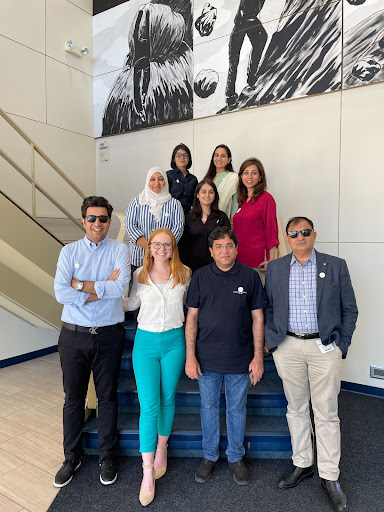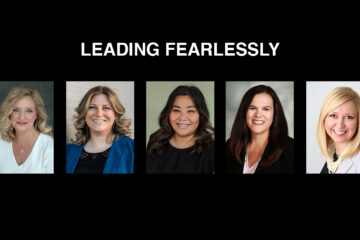By Emily Kestel
In June 2022, a cohort of human resources leaders from Pakistan visited Des Moines through the U.S. Department of State’s International Visitor Leadership Program.
Through an opportunity with the Iowa International Center, I was able to spend an afternoon with them talking about gender inclusion in American workplaces, and what Fearless is all about. The group also met with leaders from Principal Financial Group, West Bank and Women Lead Change.
In the months after they left, I found myself wondering what they took away from their conversations, and so I asked a few of them to reflect on what they learned while in Iowa.
Raza Shamsi, human resources manager of the Punjab Vocational Training Council for the Government of Punjab, and Gurbuksh Rajpal, assistant vice president of the National Bank of Pakistan, shared their thoughts, which have been edited and condensed for clarity.

What surprised you in your learning about how American business leaders address gender inclusion in the workplace?
Shamsi: That there is no patronage for gender inclusion in the workplace at the federal level or state level. No specific quota for employment of females has been allocated by legislation.
Rajpal: The USA is portrayed as having a lot of gender and race biases. But when I got the opportunity to visit and experience their culture up close, my perceptions entirely changed. Despite all the challenges, organizations themselves are stepping up and they have put in place quite a lot of structures to address these issues.
What do you think American business leaders could be doing better in terms of gender
Inclusion?
Shamsi: American businesses could be doing better in terms of gender inclusion by ensuring equal pay for all. No doubt the American Equal Opportunity Commission has been established, but it seems to be not very effective because still there is not equal pay for males and females.
Rajpal: There are a few things that I felt American business leaders need to ponder on. First of all, make it a business imperative. Gender equality and inclusion should be viewed as a business imperative that increases profitability, not merely an initiative. Companies should lead by example and break the status quo by ensuring that there is more than just one initiative or program to address the various intersections of diversity and see that no group falls through the cracks. Always remember that gender equality and inclusion is good business. They should definitely start with a salary review of all employees to ensure that men and women in equivalent roles performing at equivalent levels are compensated equally. Secondly, create conditions that will ensure that they have a level playing field for success.
How is Pakistan a leader in gender inclusion? What are areas of improvement?
Shamsi: Pakistan is a leader in gender inclusion because it has ensured gender inclusion in public sector organizations by enacting legislation. A specific quota for recruitment has been allocated by the Fair Representation of Women Act, which says there must be at least 33% representation of women in governing bodies and boards of directors of each and every public sector organization, a 15% percent quota for recruitment of female employees in every public sector organization, and there must be one female member out of three members of anti-harassment committees of organizations.
The result of all these measures is that we have female judges in the superior judiciary of the country. We have female heads of organizations. We have female surgeons general in the Pakistan army. We have females as elite police officers.
A lot is being done for gender inclusion, but there are still areas for improvement. There is a need to run programs to change the opinion of males about working women. There is a need to introduce flexible working timing for female employees.
Rajpal: Pakistan is the fifth most populous country in the world, with nearly 227 million people, 49.2% of whom are female. Women, however, continue to remain underrepresented and are restricted from taking up positions due to systemic, economic and literacy challenges. Despite these challenges, Pakistan has taken progressive steps towards gender equality and inclusion. The most noteworthy recent step towards women empowerment in Pakistan was the Gender Policy Framework that’s aimed at providing defined objectives for improving the lives of women and providing them with equal opportunities to excel in a professional sphere.
Pakistan is also signatory to the 2030 Agenda and stands among one of the first countries to formally endorse it through a unanimous parliamentary resolution. The Agenda’s fifth goal is to achieve gender equality and empower all women by 2030.
Another landmark policy is the Banking on Equality Policy by State Bank of Pakistan to reduce the gender gap in financial inclusion by bringing a shift towards women-friendly business practices in the financial sector.
There are definitely some areas of improvement, like promoting equitable access to work opportunities within workplaces, tackling gender stereotypes in workplaces and encouraging progression of women through adequate representation in workplaces.
So basically, we realize that there are problems that need to be sorted and we are hopefully on the right path to tackle them efficiently.
Why is gender inclusion important in the workplace?
Shamsi: Research has shown that gender inclusion increases workplace productivity. Gender inclusion is a blessing for those countries that have workforce deficiency.
Rajpal: Not only is it the right, fair and just thing to do, but it’s also linked with having a cohesive and productive workforce, which makes it a win-win situation for businesses. And it eventually translates into improved national productivity and economic growth.
Special thanks to Kassi Bailey, international programs director at the Iowa International Center, for her help in communicating with Raza and Gurbuksh, and for inviting Fearless to talk with the group in June 2022.


